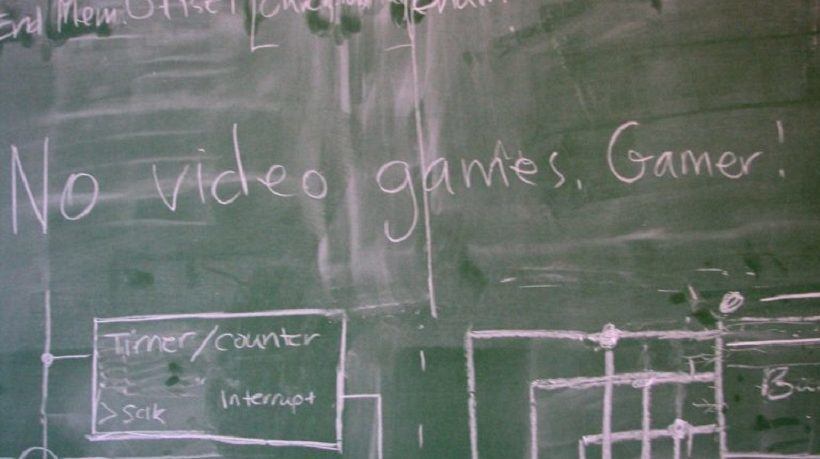Video Games, To The Fore
In LearningLovers.org we wanted to keep an interview with Rafael de las Cuevas as a videogame analyst, so he could provide us their vision of the sector of video games in the field of education and training.
Video Games As A Teaching Tool
"I believe that video games as a teaching tool have much potential themselves. In fact, there are games that are being used to teach in schools.
There are several historical sagas. There is one published in Spain, by FX Interactive, which deals with Rome and medieval lands... It is a whole saga. It is called Imperivm. That saga is being used in schools, because it is a saga of strategy, where you can select resources. You can build a Roman city with several deliveries: One is in the time of the Republic, one of the Empire. It is well documented, as authors were consulted with historians, and all buildings are quite faithful to the original; also the customs, the taxes... all right to the "gameplay", obviously. It is not very accurate, but it is useful to teach in a fun way how classical Rome was."
"In this subject, I worked in a journal of history; the plot of the games has a segmented story, usually with different periods or mixed characters to fit, but it respects a global idea, which is a first approach to the subject. It's like when watching a movie at school; it was known to be a fiction, but the teacher indicated the differences."
"As for spatial perception, I think there are games like Minecraft that are very good; I always equate it to when you were little, went to the beach, made a small sand castle, and you drew a path in the sand... but, of course, with great further possibilities. In Minecraft, you can create the largest buildings you want, you can create rails with wagons on top, you can do light switches to get the light from one place to another... It is something that enhances the creativity of children in an exciting way. There, I think there is much potential."
"From the educational point of view, when you want to create a game out of nothing, I do the analogy of movies: It's like when you want to make a movie from scratch or a documentary from the educational point of view. It will be fine if those who do it are well supported; but, usually, they do not have access to the great resources that a major producer would have. I have seen it many times: There are very well thought out games out there, and very good ideas, but they are made by very small teams, and children get entertained only for a while, then they get bored, and they go do something else."
"Video games developed for tablets and iPads are fine, because they are simple, especially when they are focused on very young children to handle basic concepts that are easily understood. Video games are more interactive, which is a a good thing and a bad thing: Being more interactive is ok, because there is more immediacy, but then interactivity is also possible if you are given a pencil and a paper when you speak with someone else..."
Video Games In The Continuous Training Of Employees
"For employee training, I see many utilities. For example, the papers from Panama were investigated by the International Consortium of journalists. They have developed a game, Starway to Heaven Tax, which tells you: "Get into the skin of a politician that has a heritage, a banker to whom we don’t know what is going to happen...". It is a simple game of elections. Sometimes you say "Well, I will start a society", sometimes you are told "Bad luck, you have been caught", or for whatever reason you do not get investigated and you pass the game. Returning to the subject of training, I think that what is called gamification, which is to create a system with rewards or immediate gratification, can serve for that. It consist on gamifying training, for example, by a type of questionnaire as the one at the papers of Panama, but reviewing a number of subjects which the employee is learning at that time, as a new software, and giving points or stars to the user as he or she is completing the game, so he or she feels rewarded: This way, it can work."
"Then there are also pages to learn code, which are very well designed, because you learn code from the same page: I think this is a very simple way to learn (Codecademy, Code.org). These pages will not replace teachers, because having a teacher is still the fastest and most effective way to learn something, but there is much more interaction. There are things you're going to ask to the teacher and it will not be in this example of the web that teaches you, but these websites still work very well. In Codecademy, there are things like Python or Ruby that you can learn, and this is really is quite agile and well designed. This, for any company, can be used for training. I think learning code from the web should never replace learning from a teacher, absolutely never, but it is a good complement for a very specific thing; to serve as a reminder to employees."
"Another thing is to get the employee going in there and using it. There, you have to motivate them somehow. I think that if a game is well designed, it is much more attractive than the typical questionnaire you send and they answer online, or the typical 'billet' received by the employee."
"You could use video games to teach skills in the company, but the problem is always about the resources: To do something attractive, if you're going to develop a game that is visually nice, for example in 3D, you need to have enough money; a graphics engine can be very expensive. You need someone to design a bifurcated narrative writing and who knows how to do it properly. You better not request this from any marketing department person who is dedicated to 'writing', because the result could be a bit ridiculous."
"There is a company called BioWare; they are video game developers that create RPG (Role Playing Games). The most important thing they have to do is bifurcated narrative: This is very important when you have to be taking decisions, those decisions have consequences, and you get derived to another scenario. Here all these are very well done: Many times, different decisions arrive at the same point at the end of the game, or they go to two different places, and the game will increasingly bifurcate more and more. For example, in job interviews, when you have dynamics where you are asked "What would you do if ...?", I think it would be nice to present a video game. But, again, this game should be well made and attractive, because otherwise it could be a bit ridiculous."
"There are games like Fireworks, for example, where they are experts in bifurcated narrative, and it is very interesting to see how they do that for designing the consequences. Then there is a developers company called Telltale (tell a story), where what they do is what was once considered to be the classic adventure game genre: There is no action, it's all bifurcated narrative. They have done everything, and they are now creating famous series. They are with The Walking Dead, which is also like that: You have 3 friends with whom you go on a vehicle and there comes a time when you are forced to choose between saving one or the other. No time: Zombies will eat one of them! You choose, and then the consequences come. Maybe you let one die and they were someone fundamental (a hacker who would would allow you to open a door), but you have chosen another one, so now you will have to use their good things."
"I would encourage employees to play these kind of games as Telltale. In Bioware games, what happens is that they are very complex and you need more things (like learning inventories), so they require more hours. However, the Telltale games are great, because they are from the Game of Thrones too: Those would be good especially for decision-taking, and to encourage employees to be more proactive. I think for the development of these skills Telltale games could be useful."
"Look, there's another indie game: If, for example, you work in a border control, or you want to do something similar, or for people working in NGOs, is well suited. In the game, you play as a customs officer in an invented republic with a very strict control. There are people coming, they'll tell his story, and you have to see that everything is in order. The first cases are very easy, but then you're seeing more nebulous things, like a person who has many children. If you do not let him enter it will be floating in a bureaucratic world, and you begin to raise moral dilemmas. I think that this comes in handy for this kind of work. Do not forget that in the game there is always escapism, but I do believe that it is useful to stir up a little your consciousness or spur you to take decisions, to avoid being so afraid of taking decisions. A game is a safe environment where if you 'mess up' nothing happens; you can go back. Traditionally in the game, if you do it wrong, you get killed and you come back, but now there are bifurcated narrative games where if you do it wrong, the game is not over; you continue as you can and you can do well in other things. That, I think, is good."
Augmented Reality And Virtual Reality In The Game
In AR and VR I have seen little applied to video games yet. I've seen devices like Google Cardboard and Samsung glasses, in which mobile phones get set, and well, they are funny, but the really good ones are the high-end devices, which are Oculus, Vive, and at another level, the one that PlayStation will display. These, so I am told, as I have not test them yet, allow you a big dip at an angle of tremendous vision and I think in the game itself it is going to involve a big change."
"When the Wii came out, I was among those who said 'Well, the movement control is okay; it will appear in many games, but it also has its limitations'. There were people telling me that we were going to handle games just in this way, but then it turned out some other way. But the VR in video games I think it will be a big change. It is being tested for a long time now, and several years have still to come until these devices get to be affordable. Oculus is worth 800 euros, that’s a lot of money! And I think yes, well, it is a step ahead; 3D video games already exist, which are immersive environments; VR is just one step ahead in immersion, to feel you are physically over there."
"I see a huge potential in video games. In the field of game with some training, I do not know. I see it ok again for all exercises about spatial conception, I see that it has a potential in journalism to put the viewer in the situation, for example, of how people are living their everyday life in Idomeni; it is another step from seeing a photo or watching a video. In training and education, as it is more immersive, it probably will help get beyond being in front of the computer or getting ahead of the game console. You have an incentive to experience that."
The Game Player Profile
"Defining the majority of video game player profile in Spain is very easy: The football games players and the war games players, or the Colony or Battle Knight players. That is the major player profile."
"Then there are the players who have been playing for a long time and these profiles are a little more dispersed. There are mobile gamers and then there's the player profile that invests a long time and tries all kinds of games, which is very large as well, and it is growing, because there are more and more generations of young people who have played more video games than we did. More people, I mean, because when I was a child I played a lot, but from my classmates, out of ten, maybe we were only two who played video games, and that's it. But not now: Now, may be five or six out of ten who play a lot, and those people are growing and are playing more mature, deeper games. And these games themselves are very interesting, because there are games that can get into the skin of a troubled teenager with very good scripts, where you have moral choices which are never black and white, but there is a gray scale, and action games or adventure, with beautiful architecture, that have very intelligent game mechanicals, some of them very well thought, which is an art in itself, like riding a mechanical over another. There are games that are telling metaphors of life, which are also amazing."
"I'm playing a game of a guy who did a game that was very successful, and it was a guy who did it almost single-handedly. Everyone called him, he did interviews at a level of world of connoisseur of these games, and he was fine at first, but then he went into a brutal depression because he said 'And now what do I do? I'm a guy that I have left here my game because I liked it and I have not found another story'. He went into depression and wondered: 'What is expected of me now?'. What did he do? A success over another. He did a game in which a character was invented; during the game, you interact with it in 3D and he, the creator, is presented with his real name, and he says that he is going to talk about someone who you probably do not know; that he will tell about the games he has done and that it might seem silly, but you'll end up seeing that he had good ideas. He carries you through a lot of prototypes and he is talking to you. Then you realize that it is himself, though he never tells you. In these games, a mass player profile grows, but also increases the profile of the player who knows the big productions that are good."
Video Games Against School Bullying
"Video games could be used to deal with bullying in schools. There are already some; or, if not, there are video games that could be madefor this purpose. Perhaps forcing students to play something won’t be useful, but if they play a particular game among them, I think it could work, as they would understand it as something they are discovering by themselves, not as something that is imposed on them. But I say this as someone who is totally unenlightened on educational techniques."
The Community Of Video Gamers
"Video games create communities; they really do. As in everything, there are extreme cases. There are extreme cases of bullying in video games, there are extreme cases of wild sexism, and there are players who are despised if they try to show that there is still sexism in video games. There has always been machismo in literature and films. However, of course, as video games are a younger market, aimed at a younger audience, there is much control and there are many clichés that are repeated, many patterns, and then, when someone tries to show them, there are sectors that seem to me very brainless people who interpret it as an attack on video games. These are people who love video games, and I love video games, I do, but I would like to improve some aspect like this. People who report it get attacked in a really tough way, but the general gaming community I think is terribly nice. If you go to a game show or hangouts organized by people, forums, of some sites, you see the gaming community is very healthy people. When I was younger, I met other people throughout video games communities, people with whom you speak in a forum and then twitter with; there are fantastic people to get to know. It is a community that is created of people who were considered 'Freaks', people who were looked upon as oddballs, and these people were giving mutual support."
Competition And Cooperation In Video Games
"I think there's a little debate between competitive games and cooperative games. Previously, the social game was that in which you were at home, you dialed two controls to the console, two people were playing, or you played and your brother was watching and you interchanged the command. That was nice, was great, and it's a shame now that it has lost a bit in favor of online gaming, because online games allow many more players and this facet of game with two players, or three, has been neglected... The developers have neglected it. The massive multiplayer game is the online game."
"There is some debate about if there are more competitive than cooperative games. I like both. I like all kinds of games, including war games. I suck, I always get killed, I never look to see if there is someone else... But I like more the games that are cooperative, in which you meet with four other people, for example, and you're reaching goals. In video games, most of those which do that, you are also shooting, either zombies or aliens, or either you are in a real war. This is escapism. But yes, I like the cooperative games and there are very good ones. There is a game called Left 4 dead (which is a pun, as "left for dead", or abandoned), and in which there are four players in a zombie holocaust. It started a little wave of zombie revival, in movies as well, because it came out some time ago and has a very, very good design. It is designed to force players, a bit without you noticing, to cooperate, because it is a game that is based on four people. You have to get to a place, a refuge, traverse the entire screen, and if you go by yourself, you are always getting killed, because there are zombies that have special features: There is one that has a very long tongue, then he grabs you, you get hooked, and then you cannot drop. They are placed in a way that is very difficult to see. Then there are others who spew a super disgusting thing and go for you because you smell. So, what's up? If you go by yourself it is impossible to reach the goal, or virtually impossible. The game is designed so that when one of these zombies takes you, one of your companions have to shoot him or punch him or whatever, and then you get free. There is a time in which zombies are attacking you and there is a state where you cannot stand up. One of your companions has to come to help you stand up. When you have little life resting, everyone has a backpack with a first aid kit, and then, if the partner is ok, he gives you his medicine cabinet because he knows that if you get killed, it will also be more difficult for him to reach the goal. Those are very well-made mechanicals to cooperate. It is a game that brings people together. As it is about zombies, which is also not based on killing people, you take it to joke; you're not under the stress of war."
The Extravaganza Of The XXI Century
"When the film industry came to life, it began at a very humble barracks and then it became the great entertainment of the 20th century. I think that video games are the great entertainment of the 21st century, because technology continues to grow in things like VR, in increasingly realistic things, and more and more possibilities of what you can do with a video game open."
"The game is a bit the new cathedral, because in the game, if you take a look, there are sculptors modeling the characters in 3D and they give them life. There are architects, because they are creating worlds in three dimensions with a set of rules that create a new architecture beyond the real architecture; because it has the rules that you want it to have. There are musicians and film musicians who are turning to video games, to soundtracks too, which are a bit interactive, because they are layered, and certain layers are entering as the game environment evolves. The player can enter and exit a site, the player can do one thing and do another. There is music to suit. There are interaction designers; there are artists who design the concept; there are painters, there are artists who design the whole concept and the 'look' of the game. It is like a cathedral; it goes beyond that, because in a game you're in a world. In these Bioware games, there is a whole galaxies saga where there are entire planets with their characteristics. Soon a game will come out, I do not know what that will be, in the high play world, and the technique is very good: It is also a game of interstellar transition, with a galaxy that is virtually infinite, because it is generated procedurally - that is, it is being created as you go exploring worlds. You can see a planet that has just been created randomly. They have artistic designs (a type of tree, a type of grass, a type of animal), which are then combined at random and are artistically very nice."
"I tend to do a lot of film similes, because although I think those are two different worlds, and different ways to express themselves, in terms of mass phenomenon or in terms of market, both industries share things. The film world has everything: There are very good movies, there are films that are not that bad, then there are Blockbuster movies that everyone says that are repellent, and there are some that are absolutely terrible. This also happens in video games: They have a very large and immersive artistic potential, a kind of different feeling from cinema and theater or literature. It's something else, it is an immersion in a world that I love. Then what can I tell you?"








